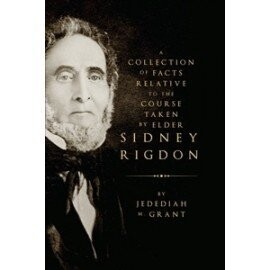Collection of Facts about Sidney Rigdon (1844)
Jedediah Morgan Grant (soon to be called as a Counselor to Brigham Young in the Church's First Presidency) wrote this treatise shortly following the martyrdom of Joseph Smith. It was on this occasion that Sidney Rigdon offered himself to the Church to become the "guardian" of the Church and of Joseph Smith III while young Joseph was still not of age to act in the calling of "President." Elder Grant follows events in Rigdon's life as a member of the Church; his early influence on Church direction and policy; his service to Joseph Smith as his First Counselor in the First Presidency; and his subsequent relocation to Pittsburgh, Pennsylvania. The verbatim record of Rigdon's excommunication trial by the Quorum of the Twelve is particularly revealing with most of the Apostles offering personal knowledge and insight about Sidney Rigdon's character and behavior. 88 pages.
Reviewed by Roy Schmidt for the Association for Mormon Letters Jedediah Morgan Grant was an eyewitness to many of the important events in 19th century Mormon/LDS history. He was an enthusiastic missionary, a President of the Seventy, an Apostle, and a member of the 1st Presidency of the Church of Jesus Christ of Latter-day Saints under Brigham Young. During the so-called Mormon Reformation he was known as “Brigham's Sledgehammer” for his tireless sermonizing and calling the Saints to repentance. He is perhaps best known as the father of Church President Heber J. Grant. Grant knew Sidney Rigdon well, particularly after the summer of 1833. The work under consideration in this review was first published in 1844 by Brown, Bicking & Guilbert, and is pretty hard to find. I am most grateful to Dan Hunter and Archive Publishers for making the current edition available at a very affordable price. If the reader is looking for a “fair and balanced” treatment of Rigdon, this is not the book. Grant contends his subject was a power hungry, back stabbing egotist who opposed Joseph Smith at almost every point. He goes on to state it was Rigdon who was responsible for all the Saints' problems in 1838 Missouri. After quoting the most inflammatory parts of Sidney's July 4th sermon, Grant writes, “The foregoing extract from his oration, as anticipated by the judicious, was the main auxiliary that fanned into a flame of the mobocratic portion of the Missourians. They now had an excuse, their former threats were renewed, and soon executed, we were then, as we are now (by many,) all made accountable for the acts of one man; death and carnage, marched through the land in their most terrific forms ...” (16-17) When the Saints landed in Illinois, Rigdon, according to Grant, was mostly inactive in the affairs of the Church. “He began to say that it was now his privilage [sic] to get rich, he went so far as to say 'he would never follow Elder J. Smith's revelations any more contrary to his own convenience, he also said that Jesus Christ was a fool to him, in sufferings.'“ (20-21) Things got to the point where Joseph decided he had enough, and would no longer accept Rigdon as his counselor. Hyrum Smith came to Sidney's defense, pleading with the church to sustain him for another year. The conference sustained Rigdon, but Joseph Smith called and ordained Amasa M. Lyman to succeed Rigdon. When Joseph was asked how he could do that when the Church had just sustained Rigdon, Joseph replied, “Why, (said he,) by the same rule that Samuel anointed David to be King over Israel while Saul was yet crowned.” (23) Rigdon finally decided to go on a mission to Pittsburgh, taking his family with him. After Joseph Smith was murdered, Sidney Rigdon hustled back to Nauvoo, offering to head the Church as a guardian. Most will recall that plan was quashed after Brigham Young made an impassioned plea for the Quorum of the Twelve to lead the Church. Young's position carried the day. Rigdon stated he supported the twelve, and asked what they thought of his returning to Pittsburgh. It was agreed he should do just that. Brigham Young then stated Rigdon had held a secret meeting during which he proclaimed to having received the “Keys of David,” that he had received authority from the Lord to “organize the kingdom spoken by the prophet Daniel,” and that had received keys allowing him to “ordain men to be Prophets, Priests and Kings to the Gentiles.” (28) This led to Rigdon's trial before the Nauvoo High Council on September 8, 1844. This was, in my opinion, no more than a kangaroo court. Minds were made up even before the hearing began that Rigdon would be excommunicated. Nonetheless, the proceedings were quite interesting. The event was open to the public, and began with a hymn and a prayer. Although Bishop Newel K. Whitney was the presiding officer, Brigham Young took charge, thus establishing the preeminence of the Twelve over the High Council. That preeminence continues to this day. Rigdon was not present because, as he claimed, he was sick. This was pooh-poohed by the court who claimed he was well, and people had seen him that very morning. Rigdon had no representation during the proceedings, nor did any witnesses speak on his behalf. Strong testimony against Rigdon was offered by Brigham Young, Orson Hyde, Parley P. Pratt, Amasa Lyman, John Taylor, W. W. Phelps, and Heber C. Kimball. At the conclusion of the testimony, “Elder W. W. Phelps arose and offered a motion, that Elder Sidney Rigdon be cut off from the church, and delivered over to the buffetings of Satan until he repents.” (68) The vote was unanimous in the affirmative. This section of the book is, perhaps, the most important part of the work. The language is rich, full of the hyperbole so typical of writings from the mid-nineteenth century. It is well worth the reading. Before closing this review, I would like to mention a statement by Jedediah Grant occurring quite early in the book regarding the organization of the Church: “... it will be necessary to give a short sketch of said church, which was organized in the town of Manchester, Ontario county, State of New York, on the 6th day of April A. D. 1830, by Elder Joseph Smith . . . .” (5). I bring this up because, even today, there is controversy among Mormon historians regarding exactly where the Church was begun. The official position of the LDS Church is that the event took place at the home of Peter Whitmer in Fayette, New York. However, a number a credible historians agree with Grant that Manchester is the place. I believe the evidence is tilting towards the latter. I believe anyone interested in the early history of the Mormon Church, including the Community of Christ and other Restoration churches, will benefit by reading this work. It is short and concise, and really projects the tenor and flavor of the times. It is well worth owning.
| ISBN | 9781930679702 |
|---|---|
| Author | Jedediah M. Grant |
| Age Group | 12-18 |
| Book Type | paperback |

